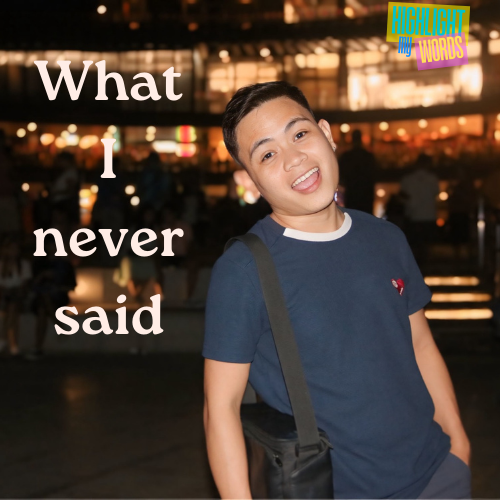What I never said
Hi, esteemed Stemians!
I am here again to share my insights on the phrase "What I Never Said." This expression encourages us to express the words we keep to ourselves. I was raised in an environment where I spoke my mind freely, often without considering the consequences. My siblings frequently scolded me for my informal, unrefined attitude, warning that I could easily get into trouble if I didn’t manage my words better. When I was younger, I didn't understand fear, it simply wasn't part of my experience.
As I grew older, this candidness remained part of my personality. Despite this, I managed to make many friends due to my honesty. However, my perspective shifted when I began working in the BPO industry. Interacting with professionals taught me valuable lessons, particularly about how to frame negative comments in a positive light. It also made me more mindful of my choice of words.

Q1: Do you usually keep quiet rather than hurt feelings?
For me, keeping my feelings and thoughts unexpressed torments my mind and emotions. However, it ultimately depends on how the listener receives those words. It's better to express the thoughts that cause you pain, as doing so helps you confront your feelings. It's not just about the words themselves, but rather how you interpret and react to them. The choice of words is important, as they can significantly impact someone’s mental health. Always consider how your words may affect others. So my answer is to speak when needed.

Source
Q2: What kind of things or situations do you usually keep quiet about?
I remain silent when I feel strong. I used to keep my mind calm and give myself time to think of the right words before speaking up. Staying quiet for now means avoiding adding fuel to the fire and preventing collisions.
Q3: Do you think it's okay to keep quiet about things that have hurt you?
Experiencing pain is a part of life, it's a reality we all face. It's okay to be quiet and acknowledge your feelings, but too much silence is not good. As I mentioned, you should speak when needed. If you are hurt due to your own actions, accept it and learn from the experience.

Source
Q4: What do you think about Steemit's policies regarding the author voting system, the SLC (Steemit Learning Challenge), the Steem burning, and the community support program?
I am becoming familiar with Steemit's policies as I continue to learn about this platform. I tend to be on and off here while trying to understand the entire process. Regarding the SLC, I am also learning about it, and I find that it is helpful for newcomers like me. I'm not entirely sure what Steem burning is, and I'm trying to understand it better. As for the community support program, the only support I've received is from my invitee, @marzyoung22. I've been asking for his guidance since I joined, and little by little, I'm learning the basics of the process.
Q5: What do you think about this quote from philosopher Francesc Torralba?
"There is a guilty silence, that of good people who remain silent when an injustice is committed, either out of fear or modesty."
Sometimes being silent can harm someone. Speak up with righteousness. Be responsible to speak out against injustice. This phrase by Francesc Torralba encourages us to speak up and be courageous in doing what is right. Everyone is encouraged to fight against injustice.
That's all for today because I am out of words already. LOL
I encourage these folks to share their insights:
@fersonjase @jes88 @marzyoung22
Regards,
Cali Kingzt